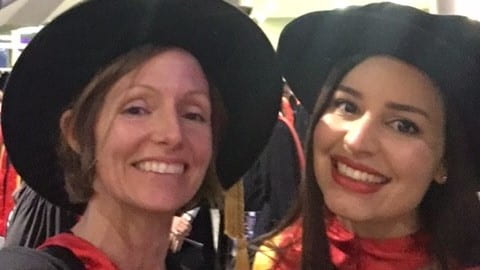Photo from the left: Professor Anthony Phillips from Biological Sciences, CHEMMAT’s Dr Michael Hodgson, CHEMMAT PhD candidate Yixuan (Jennifer) Wang, CHEMMAT’s Professor Wei Gao
Yixuan (Jennifer) Wang
Thesis title: Electrospun silicon oxycarbide fibre mats and its composites: Fabrication and properties
Supervisors: Professor Wei Gao, Dr Filicia Wicaksana
Xiaoyu Yue
Thesis title: Titanium Dioxide-Based Nanocomposites as Highly Efficient Electrocatalysts for Methanol Oxidation Reaction
Supervisors: Professor Wei Gao, Dr Filicia Wicaksana
Abstract: With the fast-increasing energy demands and rapid depletion of fossil fuel resources, direct methanol fuel cells (DMFCs), as an alternate clean energy source, are becoming one of the most promising replacements for fossil fuels. DMFCs have several advantages including high specific energy, high energy conversion efficiency, easy to operate, easy to transport, and clean for portable applications. Platinum-based catalysts are the most widely preferred anode catalysts for methanol oxidation reaction in DMFCs. However, the sluggish anodic kinetics, high cost of noble metals and unstable carbon supporting materials have hindered their wide applications. Therefore, exploring and developing low-cost, high-performance, and durable anode catalysts have been the major challenge for the application of DFMCs. The combination of metal particles, carbon materials, and TiO2 has been considered as the promising pattern to improve its conductivity.
We designed and prepared novel non-precious metal Ni/TiO2-C catalysts for methanol oxidation reaction. With improved surface area and enhanced conductivity, this catalyst displayed superior catalytic performance and stability. As a non-precious metal catalyst, this new-style catalysts significantly reduced the cost of Pt containing catalysts and open a new path for the development of a large scale methanol oxidation catalysts.


Sina Sheikholeslami
Thesis title: Long-term Field-Performance of Waterborne Coatings
Supervisors: Professor Wei Gao, Professor David Williams
Abstract: The long-term field performance of several environmental-friendly coating systems was evaluated via both conventional methods and a newly-developed test. We used the full waterborne non-hazardous Chrome-free materials which were developed by Fletcher Steel in NZ with Beckers Group in the UK to substitute Chrome-contained roofing products in Australasia. The new corrosion evaluation process was designed to be a rapid assessment technique, involving a modified Damage Tolerance Test (DTT) developed by NASA, the Scanning Vibrating Electrode Technique (SVET), and natural exposure at Muriwai Beach, Auckland.
Our modified DTT was capable of ranking the coating systems regarding their corrosion performance in only 7 days. Electrochemical Impedance Spectroscopy (EIS) and Open Circuit Potentiometric (OCP) investigations illustrated that our modified DTT could have superior or inferior corrosion performance of Cr containing coatings with different organic layers, substrates, corrosion inhibitors, and thicknesses. Cut-edge corrosion comparison of these coatings was also successfully conducted via a novel approach of SVET technique, which gives the time-lapse current density mapping and corrosion mass loss of cut-edges. Most importantly, the ranking order and performance evaluation using our modified DTT and SVET tests matched the same trend with samples exposed at Muriwai Beach for 24 months, showed this technique is promise as a predictive and rapid indicator of real-world corrosion performance.



Top – Examples of poor (left), moderate (middle), and good (right) corrosion performance observed via natural exposure test; panels were exposed at Muriwai Beach Exposure Site in Auckland for at least 24 months.
Bottom – Examples of Poor (top), moderate (middle), and good (bottom) cut-edge corrosion resistance achieved by SVET’s current density mapping. The top sample illustrates severe anodic current density and high corrosion loss.

Photo from Left: CHEMMAT’s Dr Jenny Malmstrom, CHEMMAT PhD candidate Isabela Monteiro
Isabela Monteiro
PhD student Isabela Monteiro defended 5th of Feb and graduated on 2nd June.
Thesis title: Co-assembly of block copolymer thin films and signaling molecules for stimuli-responsive biointerface
Supervisors: Dr Jenny Malmstrom, Dr Sue McGlashan

Farzam Shahni
19/2/21 (defence date) and 22/4/21 (submission date)
Thesis title: Minimum Variance Benchmark and Performance Assessment for PID Controllers
Supervisor: Professor Brent Young, Co-supervisor: Dr Wei Yu

Mohamed Dabbour
26/5/21 (defence date)
Thesis title: Integrated Geothermal Process and Reservoir Management
Supervisor: Dr Wei Yu, Co-Supervisors: Professor Brent Young and Professor Rosalind Archer

Pascal Lavoie
Thesis title: On the factors affecting Alumina Dissolution in Industrial Reduction Cells
Supervisors: Professor Mark P Taylor, Professor James B Metson
Completed Oral exam November 2020
